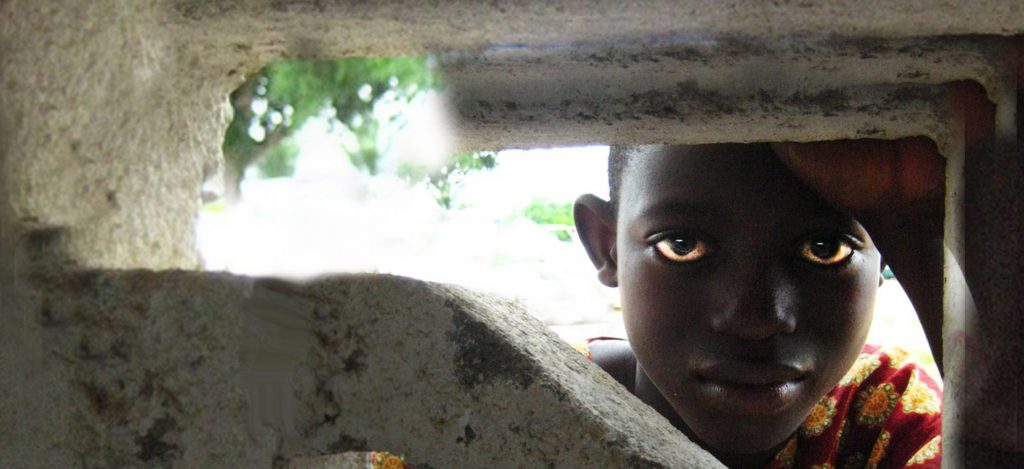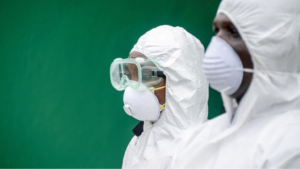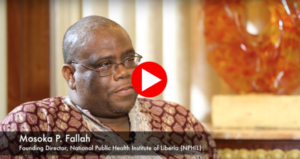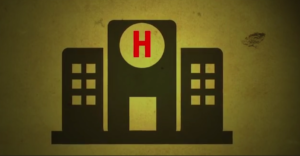
CHAMPS Technology Solves Unexplained Cluster of Deaths in Liberia
September 6, 2017
Mystery Illnesses in Liberia: 31 cases, 13 deaths (case fatality rate: 42%) *
Early Tuesday morning, April 25, 2017, the offices of the newly-established National Public Health Institute of Liberia sprang into action. Launched just weeks earlier to improve infectious disease preparedness and response, the new team was faced with its first emergency outbreak notification.

“The world was again panicking that Ebola crisis was in Liberia”
– Hon. Tolbert Nwenswah, Deputy Minister of Health

Memories of the recent Ebola epidemic that infected roughly 28,000 and killed more than 11,300 entered the new team’s thoughts. Liberia had the highest fatality rates. In response to the mystery outbreak, patients were isolated and hospital staff wore the suits and protection reminiscent of the Ebola crisis, while investigators looked into possible culprits of the outbreak.
“I was sitting at my desk when my colleague told me of the funeral sicknesses. I was shocked. I was hoping it was not Ebola.”
– Lar-yome Gobah, Public Relations Officer, National Public Health Institute, Liberia
Fear of a Mystery Epidemic
The team’s new surveillance officers and new laboratory system quickly ruled out Ebola. They collaborated with the Ministry of Health to investigate the sicknesses and collect samples of blood, urine, and plasma that were sent to the national laboratory and then to partners overseas, including the US CDC.
Historically, it’s been a challenge for scientists to solve the mystery of deadly outbreaks and their origins. Bat guano from a hole in a tree where children played was the likely origin of the recent Ebola epidemic. A caged exotic animal – civet cat or raccoon dog – from a local meat market was the likely origin of the SARS outbreak. The close contact of the mourners drinking tea together at their religious leader’s wake was the likely culprit for the spread of Liberia’s unexplained outbreak. But what did they contract?
Mystery Solved via CHAMPS TACs
The mystery was solved when an investigative group from CHAMPS/US CDC borrowed a few of CHAMPS’ TACs (TaqMan Array Cards).
“Originally we were very suspicious for Ebola and then thought it could be some type of poisoning. Turned out it was meningitis, which shocked the large group of people who were trying to figure this one out….The cards worked perfectly. Repeat testing confirmed everything and the response team began work on prophylaxis and seeing if a vaccine is available.” said Cynthia Whitney, Chief of Respiratory diseases branch at the USCDC.
“Before the CHAMPS cards were introduced, it would take about 20 hours to analyze, with the new CHAMPS TAC, it takes less than four hours… these cards yield four times the results in less than half the time it took previously – that’s nothing short of amazing…This is a significant benefit, especially when working in smaller labs in developing countries, for rapid responses to outbreaks.” says, senior molecular biologist, Jonas Winchell at CHAMPS/US CDC.
Performing the Liberia outbreak investigative testing and follow-through were Maureen Diaz and Jessica Waller, CHAMPS/US CDC molecular biologists.
Their work demonstrates just one example of many where CHAMPS technology reaches beyond the six surveillance sites – to help dissipate panic of a major global threat.
Additional Resources

A new disease outbreak stirred memories of Liberia’s Ebola epidemic in 2014 and 2015, when health workers wore protective garb, but studies suggest it’s bacterial meningitis.
Science Magazine: Liberian mystery disease may be solved
A new disease outbreak stirred memories of Liberia’s Ebola epidemic in 2014 and 2015, when health workers wore protective garb, but studies suggest it’s bacterial meningitis.
Launched NPHIL Website: National Institute of Public Health Liberia
Our mission is to prevent and control public health threats by promoting healthy outcomes and serving as a source of knowledge and expertise.
International Association of National Public Health Institutes (IANPHI): Liberia’s NPHI is now a legal entity
National Public Health Institute of Liberia will address the huge public health deficits demonstrated by the Ebola epidemic.
Newsweek: U.S. Officials Say Mystery Liberia Outbreak May Be Meningitis


